 |
|
 |
2009
November
29-30
|
Survivor

I am happy to report that my
Verbatim
8-GB flash drive
suffered no damage at all when it went through the washing machine
and dryer with a pair of my trousers.
Premature end of month:
Barring major unforeseen news, I'm closing out November now
(uploading on the evening of the 27th). Too much to do!
I'll see you in December.
Permanent link to this entry


|
2009
November
28
|
Short notes, uploaded early in the day
This could have made sense, but on closer examination, didn't:
Apple is
refusing to honor warranties on computers exposed to heavy cigarette smoke.
Now, 30 years ago I knew that smoke would damage a diskette drive.
But is that the reason? No; they've declared that a smoky computer is a
"biohazard" to the technicians working on it. Surely not; surely their
techs can safely handle things that are considerably more dangerous than
smoke residue.
My other question: Being Californians, do they believe that although
tobacco is intolerable, marijuana is OK?
Atlanta now has a "hacker space":
Meet
FreeSide,
about which I (so far) know only what is on the web site.
A "hacker space" is a shared electronics and computer worskhop run by a club.
I don't know much about it yet, but wish them well.
(Nothing to do with "hacking" in the sense of computer crime.)
Another month, another furlough: Having been forbidden to work on Wednesday,
in order to make a deadline I'm going to have to go in on Saturday and possibly also
part of Sunday. Can't win...
Permanent link to this entry


|
2009
November
27
|
(Uploaded early. And no, I'm not standing in line at Best Buy!)
Advice to those who are about to shop...
Has anyone noticed that shopping isn't what it used to be?
And that's a good thing.
As recently as fifteen years ago, shopping involved lots
of searching for serendipity — grabbing unusual items when they were
available, or grabbing a good price when something went on sale.
That, of course, turned shopping into a recreational sport, or even a
competitive sport.
Not any more. The World Wide Web has completed the job Sears and Roebuck
started — making everything available all the time.
And it has also completed the job Wal-Mart started —
replacing "on sale" with "everyday low prices."
The thrill (or the inconvenience!) of the hunt is gone, because everything
is always there, and the price doesn't fluctuate much.
And that, I think, makes our lives better in several ways.
One of the most important is that it makes it harder for sellers to manipulate us.
This year, considerable
skepticism is being
expressed about "Black Friday doorbusters."
People realize they're being manipulated.
Yes, you can go to the store at 5 a.m. if you want, but the deals
you get won't be that much better than the rest of the time —
if you get them at all.
Another triumph for market efficiency, American plain dealing, and our new culture of thrift.
Permanent link to this entry


|
2009
November
26
|
Happy Thanksgiving!
Happy Thanksgiving!
Everything I said
last year is
hereby incorporated by reference.
But I can't claim we've reached a new pinnacle of
prosperity this year; the economic downturn has taken
its toll. Still, it's a year of milestones.
Cathy is about to graduate from UGA, and Sharon
is within a year and a half of graduating from Emory.
They're growing up!
Permanent link to this entry
How a dying disk drive
slowed down my whole computer for months
\Device\Harddisk0\D has a bad block
\Device\Ide\IdePort0 did not respond within the timeout period
Avid readers know that Minerva, my home office machine (single-core 2.4 GHz, vintage 2003)
has just been superseded by Athena (quad-core). Now for the rest of the story.
For several months Minerva had seemed to be slowing down. I didn't remember Windows XP
being that slow — nor Windows Vista. In general, there seemed to be too much disk activity,
often periods of several seconds when the red disk-activity light was on and I had to wait for
the computer to finish something.
Just yesterday, Minerva (which is on another desk now)
took 25 minutes to boot up, and my assistance was requested. It continued to be somewhat erratic,
though often working well for periods of as much as a couple of hours.
I should have looked at the logs.
Using Control Panel, Administrative Tools, Event Viewer, I saw the two "\Device..."
messages quoted above — recurring at odd intervals for the past several months,
but now extremely common.
They indicate a problem with the IDE (PATA) disk drive controllers. I had two hard disks
on one controller and two DVD drives on the other. (Bad idea; the two hard disks are
likely to be in use at the same time and should be on separate controllers).
One of the hard disks — one that had remained in the machine when I swapped disks
around and did a clean install — was the source of the problems.
It was also disrupting the other disk on the same controller.
And because it rarely suffered real failures — just very long delays — I don't
know how long I had had the problem. Possibly since installing that disk drive, around a
year ago!
It's gone now, and Western Digital is going to give me a new one, and Minerva will live to
see another day. It will probably become the financial-records computer.
Permanent link to this entry
Is "Cardholder Services" bogus? I think so...
It's scam season...
I just got a recorded phone call (itself illegal!) from something called "Cardholder Services"
which, from past experience, is apparently bogus.
They're "calling in reference to your credit card" but won't say which
credit card. They're apparently hoping I'll give them my credit card numbers.
At least, that is our past experience.
If you get a call about your credit card, hang up and call the number on the card.
If the call was legitimate, the company will be expecting to hear from you at that number.
If anyone can confirm that
"Cardholder Services" is legitimate, I'd like to know about it, and know what
on earth they actually are.
For what it's worth, Caller ID showed their number as 610-404-3141
and others
report that they're an obvious scam.
Where's law enforcement when you need it?
If pages of information about these things can be accumulated on the Internet,
and the location is known, why doesn't the local sheriff show up and do his job?
Permanent link to this entry


|
2009
November
25
|
Signetics NE602 one-chip frequency converter
One of my classic magazine articles
In the 1990s, I did a lot of writing for electronics magazines.
One of the most influential articles I wrote was the one about
the NE602 frequency converter IC, published in Radio-Electronics,
April, 1990. As of today, you can read it on line.
Permanent link to this entry


|
2009
November
24
|
The last tape drive
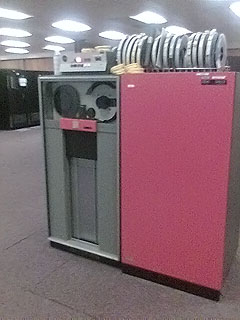 If you saw a mainframe computer room between about 1960 and 1990, you probably saw
a dozen or more tape drives, each the size of a refrigerator, standing ready to read
or write computer tapes.
If you saw a mainframe computer room between about 1960 and 1990, you probably saw
a dozen or more tape drives, each the size of a refrigerator, standing ready to read
or write computer tapes.
The University of Georgia is decommissioning its last tape drive at the end of next month.
(Here is a wretched cell-phone photo of it.)
So today (Nov. 23) I took my tapes — the two with which I arrived here in 1984 —
to see if they can be copied to disk and downloaded to a PC.
Along the way, I was given a tour of the machine room, which nowadays is very dull —
full of Dell server racks, and an IBM mainframe, which is one box that looks rather like a
heavily armored server rack, and inside is nearly empty. (Replacing a room full of 1970s-vintage
equipment!)
I also learned that I still have a
TSO account, left over from days of yore, and still renewed.
I'm going to try it out soon.
I'm told
CPS still runs
(under TSO, the way we've run it since about 1972),
and I hope to be the world's very last CPS user.
Permanent link to this entry


|
2009
November
23
|
The Achilles' heel of Athena
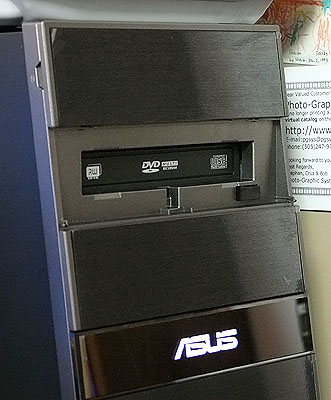
Pardon my mixed mythology...
I found something I don't like about the Asus Essentio.
The flip-down door in front of the DVD drive gets in the way.
The eject button is very hard to press even with the door open.
That would be tolerable if I only
used the drive infrequently, but in fact I use it nearly every time I work.
Accordingly, I've removed the door (non-destructively) and here's how it looks —
not too bad. The only objectionable feature is the notch below the center of the opening;
that's where the door spring would go.
[Note added Dec. 27:] What I missed:
The button can be pressed through the closed door; there is a small mark on it saying "Push."
(This is more obvious after you remove the clear protective plastic, which I had not done.)
When you push, the door opens. To close it, I just give the tray a slight shove and the mechanism
retracts it. So now the door is back in place and I am disabused of my earlier misconception.
Permanent link to this entry
A registry hack for Notepad++
[Updated.]
One of the best things about
Notepad++ is that it gives you an "Edit with Notepad++"
option on every file, not just files that it recognizes as text.
Except that, for mysterious reasons, on Athena (with Windows 7 64-bit), it didn't.
To restore the missing feature, I made a file called Notepad++Hack.reg with
the following content:
Windows Registry Editor Version 5.00
[HKEY_CLASSES_ROOT\*\shell\Edit with Notepad++\command]
@="\"C:\\Program Files (x86)\\Notepad++\\Notepad++.exe\" \"%1\"" |
and right-clicked on it to merge it into the Registry. That, in fact, is a general
way to make all files openable with a particular program; you might also want to do it
with your favorite hex editor.
Permanent link to this entry


|
2009
November
22
|
The telephone is not a toy
(or if it is, at least the people on the other end are not toys)
The other day I heard about a high-school student who sounds like my kind of person...
He refuses to carry a cell phone.
He'd like to carry a cell phone, if he could use it to make and receive calls in
the normal manner.
But in high school, if you have a cell phone, your "friends" who are addicted to texting
will send you 100 text messages a day. Of these, about 2 to 5 actually convey information.
The rest are pointless, but the "friends" will be offended if you don't answer.
Thanks to the cell phone, you can't get away from anybody.
Parents, please teach your children
(and adults, please take note):
Constantly demanding attention by telephone is just as rude
as constantly demanding it any other way.
Permanent link to this entry


|
2009
November
21
|
Highly recommended: ASUStek Silent Series
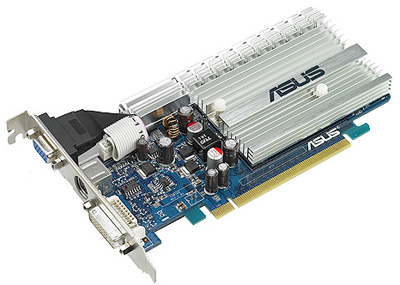 I replaced the noisy graphics card in Athena with an Asus (ASUStek) EN8400GS
(details here,
buy one here
for a whopping $25 after rebate).
I replaced the noisy graphics card in Athena with an Asus (ASUStek) EN8400GS
(details here,
buy one here
for a whopping $25 after rebate).
No fan, no aircraft-like noises — just a big heat sink. And surprisingly good performance.
Having moved 100 GB of files the slow way (via Ethernet),
I am now laboriously installing application software on Athena.
Each major item seems to want an hour or two to upgrade itself
over the Internet after I install it.
Permanent link to this entry


|
2009
November
20
|
Happy 21st birthday, Sharon!
The falling cost of computing
Here's a comparison of some of the computers I've owned
(actually, I still own all three of these):
| Description |
Year |
CPU speed
(MHz) |
CPU cores |
Register
size (bits) |
RAM
(KB) |
Disk
(MB) |
Price
(then) |
Price
(in today's
dollars) |
| IBM Personal Computer |
1983 |
4.77 |
1 |
16 |
256 |
0.36 |
$3100 |
$6700 |
| IBM PS/2 Model 70 |
1991 |
20 |
1 |
32 |
6,144 |
120 |
$5500 |
$8750 |
| Asus Essentio |
2009 |
2500 |
4 |
64 |
8,388,608 |
1,000,000 |
$650 |
$650 |
How did I ever afford either of the first two? On the other hand, how could I have afforded
not to have them? They made my career.
(At the time, we talked about getting a bumper sticker printed: "My other car is a computer.")
Even at $650, my latest computer is high-end. You can get a refurbished single-core Windows XP system
at Micro Center for about $100. That's $50 in 1983 dollars, or $15 in 1965 dollars (1965 being the
earliest time from which I remember prices).
(By the way, I didn't use a PS/2 Model 70 from 1991 to the present! But its two successors,
the first Athena and Minerva, were built piecemeal and it's hard to assign exact prices or
dates to them.)
Permanent link to this entry
Bulldogs
Two notes relating to University of Georgia football...
UGA VII,
our mascot, has died. He was an English bulldog and was only four years old.
Cathy points out that bulldogs are bred to be deformed and usually can't breathe
very well and can't give birth except by C-section. (Some French ones can't even mate.)
Could we perhaps take a step back toward a
variety of bulldog that isn't quite so extreme?
Meanwhile, we are starting to hear voices poking fun at the way
we let football fans trash the campus.
Why must our historic and (in places) beautiful grounds turn into a campground and mudhole
for the crowds at every football game? It has become traditional to "tailgate," i.e., set
up tents and grills, leaving huge amounts of trash behind. That's just not what a campus is for.
Cambridge University is adorned with signs exhorting visitors to "respect those who live
and work here." Could we do the same?
(North Campus, the area hardest-hit, dates from 1785 and is the oldest state university
campus in the nation.)
Permanent link to this entry


|
2009
November
18-19
|
Meet Athena
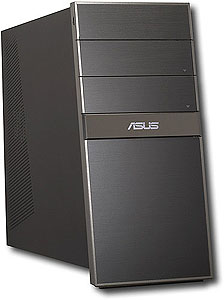 For the first time in something like six or seven years, I've bought
a new desktop computer. (And I'm recycling the name of my 1993 desktop, which was a 486SLC
running Windows 3.1, and was the first computer we named.) The new computer is an Asus Essentio
quad-core system, 8 GB RAM, 1 TB disk, with 4 open slots (2 PCI, 1 PCI Express x1, 1 PCI Express x16)
and was surprisingly
cheap at Best Buy.
Also, it's scantily documented. Basically, I've bought an Asus motherboard in an
Asus enclosure with Windows 7 preinstalled. And that's fine with me!
For the first time in something like six or seven years, I've bought
a new desktop computer. (And I'm recycling the name of my 1993 desktop, which was a 486SLC
running Windows 3.1, and was the first computer we named.) The new computer is an Asus Essentio
quad-core system, 8 GB RAM, 1 TB disk, with 4 open slots (2 PCI, 1 PCI Express x1, 1 PCI Express x16)
and was surprisingly
cheap at Best Buy.
Also, it's scantily documented. Basically, I've bought an Asus motherboard in an
Asus enclosure with Windows 7 preinstalled. And that's fine with me!
It's quiet, except for the ATI graphics card that I added in order to run two monitors;
that is loud (and apparently the loud fan on the graphics card
is a status symbol among computer gamers,
who are a bit like motorcyclists). I think I'm going to look for a quieter one even if
it's less powerful.
[Addendum: Silent, fanless graphics cards are made by,
of all people,
Asus.
I have one coming.]
Signs of the times: (1) The disk drives, including DVD, are all SATA; no PATA (EIDE) anywhere.
(2) There is no serial port. (3) There are USB ports all over the place.
Pleasant surprise: Although the mouse has to be USB, the computer will still take a PS/2 keyboard.
So I can continue my eccentric habit of using a keyboard that originally belonged
to an IBM PS/2 Model 25.
I bought several of these keyboards, surplus, a few years ago.
They are unusually compact and solidly built.
This is my first venture into 64-bit Windows. I'm sure I'll have some stories to tell...
Academia versus industry: Thinking about what I might be doing in several
years, after retirement from UGA,
I wonder if industry jobs are like this.
Permanent link to this entry


|
2009
November
17
|
Jupiter in twilight

During twilight on the evening of the 15th, I got this picture of Jupiter,
which was made by combining the 1200 or so best images out of a series of
more than 2000 video frames.
I've corrected the color to take out the excessive blue from the sky.
You can see that the sunlight isn't hitting Jupiter
straight-on, or more precisely, that we are no longer close to being directly
between Jupiter and the sun.
Permanent link to this entry


|
2009
November
16
(Extra)
|
For sale — Meade Deep-Sky Imager

Recently I bought a used original-model
Meade DSI
by mistake, thinking I could use it as a video planetary camera.
It's in good working order, as you can see from the image above,
which is a 30-second shot of M15 with no corrections.
Before I put it on eBay or an astronomy classified ad site, does anybody
out there want it? It includes the imager itself, a USB A-B cable (too
short; you should get a longer one), and a parfocalizing ring. It does
not include software (which you can download from Meade, or preferably,
just download the drivers, and use K3CCD or some other imaging package; I used
MaxIm DL for tests). It could probably stand to have its sensor cleaned.
First $60 takes it (U.S. shipping included), or make me an offer.
The Meade DSI is powered by the USB bus and has one well-known quirk:
You should power your laptop externally while the laptop is powering the DSI,
or else the laptop may not be able to deliver enough power by USB.
This one bit me with a late-model Toshiba Satellite.
Possibly also for sale: Two Canon EOS film SLRs, one of which
is the astronomy-friendly EOS 10S (able to make long exposures without
draining the battery). Just the thing for the Canon DSLR enthusiast who
would like to try film. (They take EF but not EF-S lenses.)
Inquire if interested.
Permanent link to this entry


|
2009
November
16
|
More short notes
Beware of pranks in Wikipedia: Two or three times in as many days,
I've overheard people boasting that they had put obvious misinformation
into Wikipedia, for the purpose of tripping up students who don't verify their
sources. Recall that Wikipedia can be edited by anyone, and if someone tells
you the American Revolution ended in 1945, tell them they've been had.
Covington Innovations
has a new front page, designed by Melody. Enjoy! [Yes, I know it resembles the 2003-2008 front page.]
"Printing - Restarting": My print jobs were getting stuck at the
"Printing - Restarting" stage. The culprit? A bad USB cable.
Ladies, aren't you glad you aren't
married
to Bernie Madoff?
Permanent link to this entry


|
2009
November
15
|
Extremely short notes
(Do your own Googling today; I'm too busy to insert hyperlinks.)
Today (Saturday, Nov. 14) Melody and I had a very enjoyable lunch
in Marietta with old friends
from Valdosta, alumni of
The Action Trav'lers
(well, there's one hyperlink for you),
including people I hadn't seen in 25
years or more. (And who hadn't changed a bit!)
Later, looking around in Fry's, we learned about:
- Nikon and Canon DSLRs that do ISO 100,000. That is 200 times the sensitivity of typical film.
Until now, DSLRs were comparable to film. I don't know what this factor-of-200 jump does to the
picture quality, but at ISO 100,000, you should be able to take a handheld snapshot of the stars
in the night sky. (5 seconds at f/1.8 at ISO 500 = 1/40 second at f/1.8 at ISO 100,000.)
- The modern equivalent of a tape recorder: MicroTrack II, a $200 gadget that records on
CompactFlash cards with 100 dB SNR and 0.003% THD. (Those are incredible specifications.
A really good tape recorder is 60 dB SNR and 1% THD.)
- Windows PowerShell. It deserves some attention, which I shall one day be able to give it.
Permanent link to this entry


|
2009
November
14
|
The tax deduction fallacy
I've seen surprisingly intelligent people fall into the following
financial fallacy: "I need some business expenses in order to reduce
my income tax." (Or, "I need some
interest expenses.")
Well, it's true that if you need or want to incur the expense anyhow, and it's
deductible, then you should deduct it.
And it's true that a deductible expense costs you less than it would have if
it weren't deductible.
But it's not true that you can save money, net, by incurring deductible expenses.
People are mixing up deductions with savings. If you incur an expense of $1,000
and deduct it, that means
you reduce your taxable income by $1,000. This will reduce your tax
by maybe $250, depending on your tax rate.
Deductions are cuts in income, not cuts in tax costs.
In the example, the deduction turns a $1,000 expense into a net $750 expense.
That's better, but it's still an expense.
Spend $1,000 to save $250? Not a winning proposition!
(And before you ask, tax withholding does not change this in any way.)
Some people think a deduction will pay by getting them out of a higher tax bracket —
if you cut your taxable income slightly, will your taxes fall more than your income did?
No, tax brackets don't work that way. Tax rates apply to marginal income (the
portion of income above a certain threshold), not the total income. So when you enter
a higher bracket, only the additional income (above the minimum for the bracket)
is taxed at the higher rate.
Now you know!
(One last note. The nearest you can get to "needing some expenses" is perhaps choosing to
incur an expense before the end of the calendar year,
to help equalize the taxable income across
years and and reduce the amount that is taxed in a higher bracket. I've done that myself.)
Permanent link to this entry


|
2009
November
13
|
Full, standing room only
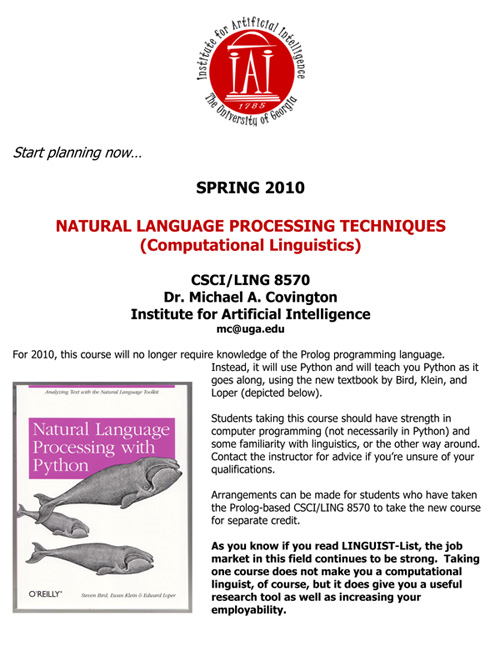
I suppose this is good news...
My
natural language processing course for next semester
is full, with at least 16 students enrolled.
The normal limit for an 8000-level graduate course is 15,
but someone accidentally changed the limit on this one to 17 and we let it
stay that way.
I may end up with as many as 20 students.
Last year we had 6; I've taught it
with as few as 3. Word has gotten out... and also, the
course has been re-engineered so that you don't have
to take CSCI/ARTI 6540 first.
Permanent link to this entry


|
2009
November
12
|
Econ-observations
[Revised.]
How not to do it: I heard someone call in to a radio show who was in the following predicament.
He always wanted to be a doctor. Unable to get into an American medical school, he went to a private
one in the Caribbean. With his parents as co-signers, he has amassed $250,000 in student loans and can't
get any more, even though he's 2.5 years away from finishing. Reportedly, these are private loans, dischargeable through
bankruptcy. If they are ordinary non-bankruptable student loans, they probably still could be discharged
on grounds of undue hardship.
So one path is for himself and his parents to go bankrupt.
The other is to negotiate some type of deferment of the loans and set out to earn $250,000 and pay them back,
rather like a person who has taken a huge loss on a business venture.
He's certainly not going to be an M.D. And, by the
way, his wife left him when he started this. What advice do we give in that situation?
As an educator, I think he should have listened to the American med schools that were turning him down.
You don't want to be at the very bottom of your school or your profession.
Hooray, inflation is coming: Inflation (a decrease in the value of the dollar)
will
make it easier
to pay our student-loan debts,
will absorb
the federal budget deficit, and will even
fix
a problem with international trade.
Or so we're told.
Should you worry about mortgage fraud? In my opinion, no, that's what the legal and banking
system is for. It's true that there have been people who have forged title documents.
But forged documents are worthless in court.
Title insurance protects you from being an innocent buyer of a stolen title. The legal system itself
protects you from fake transactions involving your property. You don't need
a "free" monitoring service.
And anyhow, why is it free? Perhaps because they are going to send you junk mail and junk e-mail.
Or perhaps for some other reason. Clark Howard's advice
to the contrary, I don't want to get tangled up in that.
(Cathy points out that trying to "steal" a house that has a mortgage on it is practically impossible.
The thief would go to great expense and end up with nothing.)
Permanent link to this entry


|
2009
November
11
|
Thermostats for conscious people
[Updated.]
Before: Complicated late-1980s programmable thermostat, with door
left open so we can reach the fan switch. Note hand-lettered labels for
visibility in a dark corner.
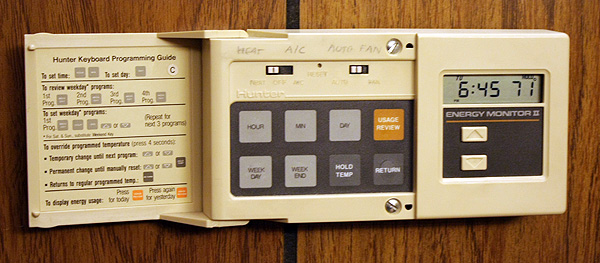
After: Simple vintage-2009 non-programmable digital thermostat with
display that lights up at the touch of a button.

We gave up on programmable thermostats because ours seemed to be a
device for getting the temperature wrong in different ways at
different times of day.
It had a large amount of hysteresis ("dead zone") to keep from overworking
the compressor, so if the air temperature was within about 2 degrees of
the setting, the heater or air conditioner wouldn't run. As a result, we
had a lot of fluctuation over about a 4-degree range.
The new thermostat aims for 1-degree accuracy and uses timing, not
a dead zone, to keep from switching the system on and off too rapidly.
We have new thermostats of this general type both upstairs and downstairs.
The key idea is, our temperature is controlled by conscious human beings.
We know whether we're hot or cold; we don't want to run more air conditioning
or heating than we actually need; and we think we make better decisions
than a machine does.
[Update:]
The new thermostat has made the house appreciably more comfortable.
Because it has no appreciable dead zone, it runs the heating system
in several short sessions
during the night, rather than waiting for a 2- or 3-degree drop
and then running it for a long time and getting much of the house too hot.
Simply having several short periods of air circulation, rather than one or
two long ones, really
helps equalize the temperature throughout the house.
We have two new thermostats. The one upstairs, for a heat pump with an emergency heat mode,
came from Wal-Mart. The one downstairs, matching in style but actually a discontinued model,
came from Honeywell-Thermostat.com,
which I recommend. They are also known as
Air & Water, Inc.
(Santa Ana, California).
Permanent link to this entry
Two short notes
Can anybody out there recommend a text editor, or at least viewer, for
files larger than 2 GB? Quite a few of them, including TextPad, go right
up to 2 GB, but that is the limit. Where did I get a text file larger than 2 GB?
Unfortunately I can't tell you. But I can tell you I didn't create it.
Found it: V the File Viewer.
Happy Veterans' Day (place the apostrophe correctly because there's more
than one veteran involved). This is the anniversary of the day in 1918 that
my grandfather was drafted and the Germans couldn't stand the thought of facing him.
Permanent link to this entry


|
2009
November
10
|
Short notes
I gave a talk today (Nov. 9) about how UGA developed its computer ethics policy
(cf. this)
and had a very different experience than when giving similar talks in the 1990s.
Computer ethics is now common sense.
Absolutely no one argued that "there are no laws in cyberspace" or that the University
should try to exempt them from the law of the land.
And nobody laughed when I said there's organized crime on the Internet.
(We receive fake e-mails "phishing" for credit card numbers or passwords
every day.) Twenty years ago, when I said such
things, people laughed, and society gave the bad guys a 20-year head start.
After a 5-year hiatus, on Saturday I again attended the
Lawrenceville Hamfest.
I found it little changed, except that really old (pre-1970)
test equipment has become scarce, and good analog oscilloscopes
(c. 1990) are abundant. Antique radios and parts for them are as
abundant as ever. I saw three, yes three, restored Hallicrafters
S-40's, although what I really want to do is restore my own.
Book for gadgeteers:
After a long delay, there is
a new
edition of Building Scientific Apparatus.
There's no other book like it!
Permanent link to this entry


|
2009
November
9
|
How the bubble happened
Until Cathy pointed it out to me, I hadn't know about
this American Public Radio program
explaining the real-estate bubble.
It aired in May 2008, when the bubble was starting to burst
but the rest of the economy looked sound.
If you don't have time to listen to it,
read the transcript.
The key claim is that the bubble resulted from bad decisions made by investors and bankers.
In particular, investors pushed bankers to make more and more mortgage loans.
This, in turn, may have happened because the interest rates on Treasury bonds were so low that investors
clamored for something else to invest in.
But if you take that last sentence seriously, APR seems to think that it is the
government's (i.e., the taxpayers') duty to borrow money at moderately high interest rates
so investors will have something to invest in. Hmmm...
Permanent link to this entry


|
2009
November
8
|
A point of theological logic
Back in the Twentieth Century, we regularly heard it said that "all religions
are equally true" and none is objectively better than the others.
("There are many paths to the top of the same mountain" as one of my fellow
students eloquently put it in 1973.)
We don't hear that so much any more. I think it's because people have come to
grasp the following line of reasoning:
If you say all religions are partly true, you're on solid ground.
They could well be correct about some things and mistaken about others.
They surely contain some goodness and wisdom, or they wouldn't have
survived.
But if you say they are all equally true, you're in a quandary.
The belief that "all religions are equally true" is itself the belief
of only one cultural group — a fraction of the college-educated
population of America and Europe. Almost everybody else disagrees with it.
So you still have one cultural group claiming that its view of religion
is objectively the best — and claiming that no view of religion is objectively
the best. See the problem?
(I am aware that the argument can be formulated in such a way that it is not a direct
self-contradiction. But when this is done, it doesn't seem as appealing as originally
intended.)
Permanent link to this entry


|
2009
November
7
|
Two short notes
Interesting camera store near Emory:
The Camera Doctor,
complete with darkroom rentals by the hour,
camera repair, and modified plastic Diana cameras on sale.
Someone at Emory must be keeping film photography alive,
because I also saw boxes of Ilford enlarging paper in the college bookstore.
Don't go there: I do not recommend
Argleton, Lancashire (in England)
as a convention site. Click the link to find out why.
But it may eventually go the way of Agloe, New York.
The lecture circuit: My series of 5 talks has turned into a series of 6.
Coming up next:
"How UGA Developed Its Campus Computer Ethics Policy,"
Computer Science Department Lunch & Learn,
Monday, Nov. 9, 1:25 p.m., Room 306, Boyd GSRC (University of Georgia).
"Schizophrenia, Linguistics, and Computers"
(same talk as given recently at Emory University, with minor updates),
Computer Science Department Colloquium,
Friday, Dec. 4, 3:30 p.m., room to be announced, Boyd GSRC (University of Georgia).
Permanent link to this entry


|
2009
November
6
|
See below
For today, I've expanded the first article in yesterday's entry (below).
Permanent link to this entry


|
2009
November
4-5
|
Four ethical insights
[Revised.]
I'll soon be giving an informal talk about computer ethics, and thinking back on
large amounts of Internet misbehavior that I've dealt with, I want to point out
four ethical insights that some people fail to have.
(1) There are people in the world besides yourself, and they have rights.
"Do unto others as you would have them do unto you."
Ethically deficient people often look down on large amounts of humanity.
Computer geeks look down on people who aren't computer experts.
Outside the realm of computer ethics, the rich look down on the poor, the fortunate
look down on the unfortunate, and vice versa. This easily turns into an
excuse to be unjust.
(2) Gratefulness is important.
Ethically deficient people often fail to appreciate good things that have been
done for them. My experience with malicious computer users is that they often
live in a world of perpetual adolescence, presuming somebody has a duty to
support them regardless of whether they are doing anything of use to others.
The idea of earning a living — that is, having to do what other
people need or want — is lost on them.
(3) We need "rules of the road." Good intentions are not enough; you have
to follow accepted practices so that you won't do unintended harm.
A corollary is that you have to follow society's rules even if you don't
agree with them. Over the years, I encountered quite a few people who simply
wouldn't accept facts about the law of the land or how organizations operate.
(4) Malicious harm is not the victim's fault, even if the victim could have
prevented it.
Computer geeks, in particular, tend to want to solve every problem by armoring the
potential victims rather than by deterring the crime. It's as if we had
(as I have said before) too many locksmiths and not enough sheriffs.
Why do you have a lock on your front door? To keep the burglars out?
Surely a burglar with a crowbar or a picklock could still get in.
The purpose of the lock is to distinguish burglary from normal entry.
You are not required to make your house impenetrable in order for
burglarizing it to be illegal.
Permanent link to this entry
Bad experiences with F-Secure Antivirus
The trouble with Windows Vista and F-Secure Antivirus is that both of them are frequently
updated on line, so a system that is stable won't remain stable.
Today I lost half a day's work time trying to fix my computer.
F-Secure Client Security 8.00 wouldn't let me log in to my roaming account,
although it had been working fine for months. I upgraded to 8.01, which let
me log in but blocked all access to e-mail (even with the firewall off and
all ports open).
[Workaround: Turn off e-mail scanning. But e-mail
is almost the only way viruses ever reach me, so I want it scanned.
[But then the login problem came back and I had to
de-install F-Secure again.]
Then I de-installed F-Secure and put on Microsoft Security
Essentials as a test. (For licensing reasons, it can't stay; it's free for
home users but not institutions.) Everything worked fine.
Because F-Secure is configured and packaged locally, I have no idea whether
the problem was actually introduced in the University of Georgia's local
distribution.
Permanent link to this entry
Short note
I had a very good visit to Emory University, about which more later.
Suffice it to say that I'll soon be doing
research with medical applications
again.
Permanent link to this entry


|
2009
November
3
|
Short note
Today (Nov. 3) I'm on the road to speak at
a university that has never
lost a football game.
No time to write much here. Instead, read ThereIFixedIt.com.
Permanent link to this entry


|
2009
November
2
|
If Quicken won't connect to your bank or credit card company...
For months if not years, Melody and I had thought that Quicken wouldn't do automatic
downloads from SunTrust Bank. (Nor two major credit card companies that we had occasional
dealings with.) And there may have been a time when this was actually true.
But now it works, thanks to an important workaround that I found.
The crucial idea is that you have to erase old, incorrect data about how to connect
and then set up the connection afresh. As long as the old information stays stored in Quicken,
the connection will never work.
Here's how it's done.
(0) Get hold of an up-to-date version of Quicken. In the examples,
I'm using Quicken 2010, updated yesterday.
(1) Go to Tools, Account List, and find the account you're having trouble with.
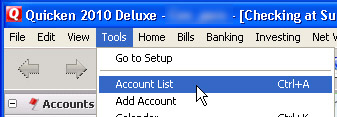
(2) Click the little gold rectangle to view the account.

(3) Choose "Edit Details."
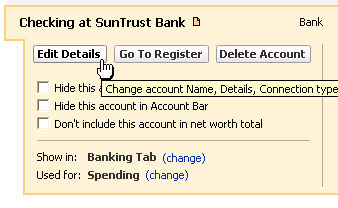
(4) Under the "Online Services" tab, remove the account from One Step Update.
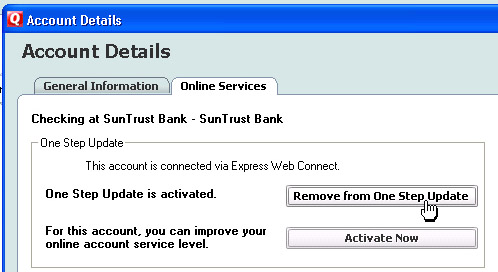
(5) Close the pop-up window, go back to the One Step Update menu, and set up the account anew.
This time it will work.
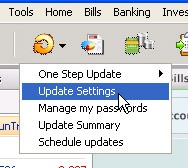
By way of background, Quicken has two ways of downloading transactions,
Direct Connect (a web API) and Web Connect (web-page scraping).
Quicken is updated frequently so that it knows how to do at least one of these
with nearly every financial institution there is.
It will choose the right one automatically, but then it may offer to "improve"
the connection by trying to switch from Web Connect to Direct Connect.
Trying to do so is harmless but, in my experience, is unlikely to help,
since if Direct Connect had been available, you would have had it already.
Permanent link to this entry


|
2009
November
1
|
Furlough day 1
I said October was over, so I'm starting November a few hours early.
Read tomorrow's news today!
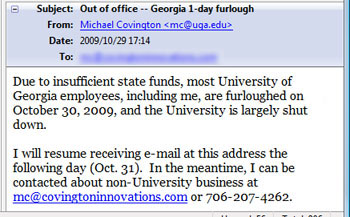 On Friday, Oct. 30, the University had its first furlough day,
and things didn't play out quite as originally planned.
On Friday, Oct. 30, the University had its first furlough day,
and things didn't play out quite as originally planned.
The problem is that, unlike a holiday or weekend, on a furlough day we're forbidden
to come to work, except for the few of us whose furloughs were officially changed to a
different day. (That will happen to me in March because I'm speaking at a conference on
the scheduled furlough day.) Being forbidden to work is better than the alternative; if
working for the University were permitted, it would be expected, and then the University
would be in legal trouble.
As a result, the University was more thoroughly shut down than anyone foresaw.
The students had a day off ("fall break," for the Georgia-Florida football game), and
the students who stayed in town (probably 80% of them) had to deal with a shut-down
campus (no libraries, no buses, probably no food). More seriously, the University is
having trouble honoring its promise not
to cut anyone's salary below $23k during the furlough.
The trouble is that our lowest-paid workers simply have no place to work if their
managers aren't present.
I'm a bit concerned about the safety of the campus under these circumstances.
I spent the day resting (remember, I'm in a whirlwind of work and travel,
and it's not over); I also reviewed a book proposal and did part of a
consulting job. I didn't answer University e-mail or even use
the University's laptop that is assigned to me for use a home. (But I did see
incoming University e-mail and handled items that did not appear to be University business.)
Today, Saturday the 31st, I'm about to go in to the office to catch up.
I suspect I won't be the only one there. [But I was!]
Permanent link to this entry
Hidden colors of the Pleiades

Here's my Pleiades picture from the other day, with the brightness and
color saturation turned up. You can clearly see that the dust cloud is
thickest toward the south (bottom in the picture) and is somewhat redder there,
not just brighter.
Permanent link to this entry
Miscellany
The Patriarch of Constantinople, one of the most important church leaders in the world,
visited Atlanta on October 29 and,
as far as I can tell, the Atlanta newspaper took no notice of it.
They were too busy telling us about "Real Housewives," a "reality" TV show about
quarrelling women (who, as far as I can tell, are not wives, but I've only watched them
long enough to recognize the show and change the channel).
The recession is officially over — GDP is up — and since GDP includes government spending,
this doesn't really prove much. Accordingly, there is doom and gloom on Wall Street.
Against programmable thermostats: We're ditching our programmable thermostat downstairs (vintage 1988 or so) and
our clunky manual one upstairs (vintage 1990) and putting in plain, simple, modern digital ones.
Instead of microprocessors, our heating and cooling will be
controlled by conscious human beings.
Initial results with
the one we installed upstairs (Honeywell RTH3100C)
are very good.
More news in a few days when the other one arrives.
Important desideratum (manufacturers take note!): We don't want the fan switch hidden
behind a door or faceplate.
As usual, I must remind people that it's Halloween, not Holloween. (Not Hall-oween either.)
Things I've overheard myself saying recently
(in a numerical methods talk, while displaying an example):
"Fortunately, this is not the only curve we can generate.
If it were, this would be by far the most specialized talk I've ever given."
Permanent link to this entry


|
|
|
This is a private web page,
not hosted or sponsored by the University of Georgia.
Copyright 2009 Michael A. Covington.
Caching by search engines is permitted.
To go to the latest entry every day, bookmark
http://www.covingtoninnovations.com/michael/blog/Default.asp
and if you get the previous month, tell your browser to refresh.
Entries are most often uploaded around 0000 UT on the date given, which is the previous
evening in the United States. When I'm busy, entries are generally shorter and are
uploaded as much as a whole day in advance.
Minor corrections are often uploaded the following day. If you see a minor error,
please look again a day later to see if it has been corrected.
In compliance with U.S. FTC guidelines,
I am glad to point out that unless explicitly
indicated, I do not receive payments, free merchandise, or other remuneration
for reviewing products on this web site. I have a Canon EOS 20Da camera and a Tektronix
TDS 210A oscilloscope on long-term loan from their manufacturers. Other reviewed
products are usually things I purchased for my own use, or occasionally items
lent to me briefly by manufacturers.
|
|





 If you saw a mainframe computer room between about 1960 and 1990, you probably saw
a dozen or more tape drives, each the size of a refrigerator, standing ready to read
or write computer tapes.
If you saw a mainframe computer room between about 1960 and 1990, you probably saw
a dozen or more tape drives, each the size of a refrigerator, standing ready to read
or write computer tapes.

 I replaced the noisy graphics card in Athena with an Asus (ASUStek) EN8400GS
(details
I replaced the noisy graphics card in Athena with an Asus (ASUStek) EN8400GS
(details  For the first time in something like six or seven years, I've bought
a new desktop computer. (And I'm recycling the name of my 1993 desktop, which was a 486SLC
running Windows 3.1, and was the first computer we named.) The new computer is an Asus Essentio
quad-core system, 8 GB RAM, 1 TB disk, with 4 open slots (2 PCI, 1 PCI Express x1, 1 PCI Express x16)
and was surprisingly
For the first time in something like six or seven years, I've bought
a new desktop computer. (And I'm recycling the name of my 1993 desktop, which was a 486SLC
running Windows 3.1, and was the first computer we named.) The new computer is an Asus Essentio
quad-core system, 8 GB RAM, 1 TB disk, with 4 open slots (2 PCI, 1 PCI Express x1, 1 PCI Express x16)
and was surprisingly










 On Friday, Oct. 30, the University had its first furlough day,
and things didn't play out quite as originally planned.
On Friday, Oct. 30, the University had its first furlough day,
and things didn't play out quite as originally planned.
